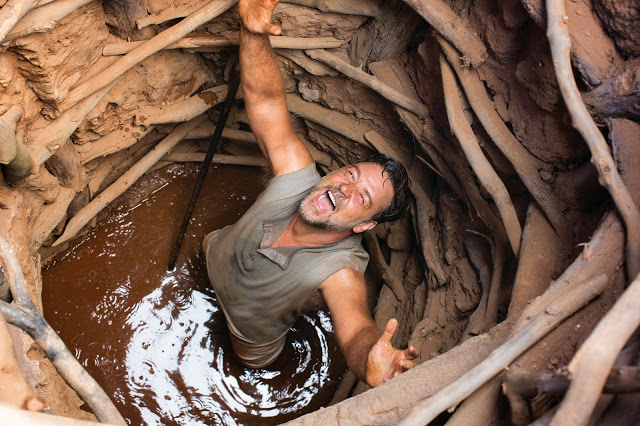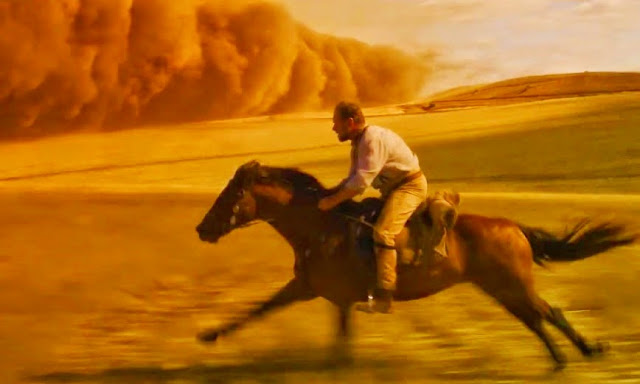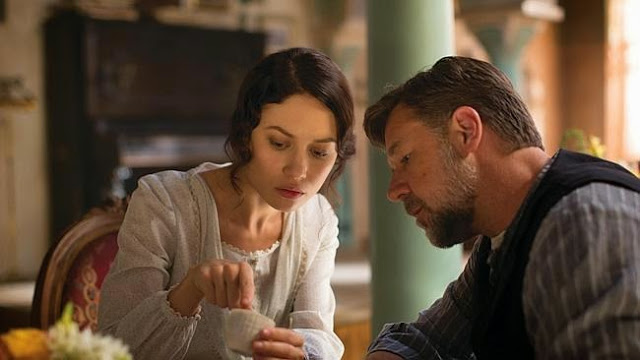The Water Diviner, the directorial debut of Russell Crowe, is a tumultuous mishmash of tones: part Indiana Jones adventure, part fish-out-of-water comedy, part Nicholas Sparks romance, all mystical goop. A throwback historical epic that’s as overwrought as it is uneven, it is almost redeemed by Crowe’s evident passion for his subject matter, which involves the Battle of Gallipoli and its woeful aftermath. Crowe clearly felt compelled to tell this story, and his ambition is admirable. His execution is another matter.
Crowe stars as Joshua Connor, a hardscrabble farmer whom we first see prowling the barren Australian landscape, searching for signs of water. It is 1919, four years after the wartime events at Gallipoli, which are presumed to have claimed the lives of Joshua’s three sons. After his wife, disconsolate from her children’s death, drowns herself in a makeshift pool of her husband’s own construction (oh, the irony!), Joshua resolves to travel to Gallipoli and locate his sons’ remains. When he arrives in Turkey, however, he learns that securing passage to the ruins is no easy task, and he takes up temporary residence in an Istanbul hotel operated by a fetching proprietor, Ayshe (Olga Kurylenko, stiff).
From there, The Water Diviner pursues an astonishing number of subplots, most of which range from unconvincing to ludicrous. On the romance front, Ayshe—a somber widow who is expected to re-marry to her gregarious brother-in-law—initially regards Joshua with a xenophobic mistrust that gradually mutates into affection. Her defenses are softened in part because Joshua quickly develops a strong bond with Orhan (Dylan Georgiades), her adorable moppet of a son. Meanwhile, Joshua seeks help in his task from the British Army, which inexplicably views him as an interloping threat and responds with brusque hostility. Undaunted, Joshua finds his own illicit passage to Gallipoli, where the Australian Lieutenant Colonel Cyril Hughes (Jai Courtney) is currently mounting an effort to scour the battlefields and identify all of the dead. Grudgingly assisting him are two native Turkish officers, Major Hasan (Yilmaz Erdoğan) and Sergeant Jemal (Cem Yilmaz, best in show). And throughout, Crowe intersperses flashbacks to the battle itself, chronicling the doomed adventures of Joshua’s sons.
Those flashbacks, with their sepia-toned lighting and slow-motion photography, are emblematic of The Water Diviner‘s failings. Crowe shoots them with a solemn gravity, a quality that’s only magnified by David Hirschfelder’s soupy score. There’s nothing wrong with a director amplifying his characters’ anguish, but Joshua’s sons are barely characters at all. They’re just ciphers, blandly attractive victims of a war that Crowe is less interested in examining than exploiting. (For a far superior take on the battle, viewers are advised to check out Gallipoli, Peter Weir’s excellent 1981 war film.) Crowe’s intentions may be noble, but his technique is shamelessly manipulative, constantly goosing the proceedings with swelling music and frantic editing. Some epics warrant elevated grandiosity, but The Water Diviner never earns its flamboyant stripes, which makes it less stylish than suffocating.
The pity is that, when he isn’t trying so hard, Crowe flashes some ability suggestive of a good filmmaker. There’s a striking sequence in the distant past where Joshua rides his stallion headlong into a sandstorm, the late and great cinematographer Andrew Lesnie capturing the image in traditional, unglossed widescreen glory. And an early scene of Joshua silently digging a well is efficient and engrossing. Crowe’s handiwork isn’t bad when it isn’t outrageous.
Unfortunately, The Water Diviner is outrageous most of the time. The movie is purportedly “inspired by true events”, a label that attempts to ascribe credibility to Andrew Knight and Andrew Anastasios’ preposterous screenplay. As you may have, ahem, divined from the film’s title, Joshua is almost supernaturally skilled at locating the presence of water. Turns out, that’s not all he’s good at finding. In one of The Water Diviner‘s more incredulous moments—which is already setting the bar rather high—Joshua wanders over the sands of Gallipoli before stopping at a certain point and proclaiming, with mournful confidence, that this is the precise spot where two of his sons are buried. (No points for guessing whether he’s right.) But what of his eldest? Is it possible that Major Hasan might have a clue to his whereabouts?
Thankfully, yes. The Water Diviner features its share of peculiar pairings, but the wary friendship that blossoms between Joshua and Hasan is the strangest relationship in the movie, which also makes it the least predictable. The scenes where Joshua cautiously negotiates with Hasan’s Turkish soldiers are, for the most part, nuanced and intriguing. Sergeant Jemal, in particular, is a welcome fount of energy and humor.
But there is simply too much else going on. Crowe crams the movie with material, but he never streamlines it, resulting in an overstuffed stew of clashing genres. The compulsory romance between Joshua and Ayshe is ridiculous, the scattered action scenes—particularly one involving Joshua’s flight from the British Army—equally so. And the film’s final act is pure schlock, featuring one final flashback that strains so hard for pathos, it squanders what little good will Crowe managed to cultivate.
And so, The Water Diviner is largely a disaster. But it is at least a watchable disaster, frequently exasperating but rarely boring. In other words, while it may be drippy, it’s never dry. And its unabashed earnestness is its own reward, which makes it less an entrant in the “so bad it’s good” canon and more of a “so sincere it’s pitiable” curiosity. It’s unclear whether this was a one-time digression for Crowe or if he intends to step behind the camera again. I might suggest, however, that if he does direct another movie, he first summon Joshua’s mystical powers and use them to miraculously locate a decent script.
Jeremy Beck is the editor-in-chief of MovieManifesto. He watches more movies and television than he probably should.



